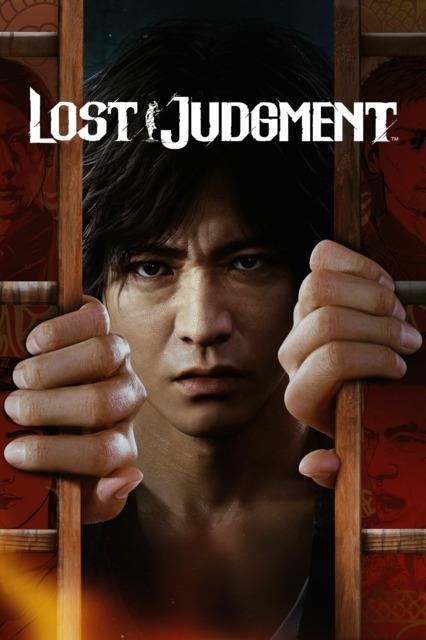
Hola muchachos and/or konnichiwa tomodachi to yet another blogging instance of me getting too deeply obsessed with a game's particulars and purging my own brain of the fine details so I can get some darn rest. This time our subject is the Ryu ga Gotoku Studio brawler-RPG Lost Judgment, the second of the spin-offs to retain the original Like a Dragon real-time combat system framed by a classic detective narrative with a few germane mini-game indulgences like tailing suspects and examining crime scenes for details. Like most RGGS games there's a vast amount of content to sift through, which is presented to the player as a mostly optional checklist of goals to pursue. These might be surface-level and relevant to the story at certain points, like the in-depth "School Stories" mode that presents most of the non-story-critical content or the one-off mini-narrative substories which are often where the series is seen at its most comical or reference-heavy. Below that is the "deep in the weeds" layer, which includes side activities like darts, golf, arcade games, races, and very Japanese pastimes like mahjong, shogi, and hanafuda.
Most achievement/trophy sets for RGGS games will task you with completing absolutely everything that has a victory condition associated with it. For as obsessive as I can be with these games, not even I have the constitution or patience to complete every single goal one of them might present. Towards the end of a playthrough, I'm usually in the mindset of sweeping up whichever trophies are still within easy reach and leaving the rest be. Now that I've reached that point in Lost Judgment—as of writing, I'm poised at the story's finale knocking out the remaining substories—I've started my "content triage" process of wrapping things up here. This blog is simply a glimpse into how that's going. (For real, I started this game a week into March; I'm ready for something else.)
I did briefly question the point of writing all this up, but then I realized that very few critics and blogger types really get into this deep-dive, post-game mechanical stuff besides trophy guide sites and Q&A threads on GameFAQs or Reddit. It's an aspect of game design that often goes unobserved by most of the player base, and sometimes for that reason it can feel like an afterthought by the designers put on the task of creating these optional checklists and trophy requirements. Not that I'd accuse them of being lazy; more that there always needs to be priorities in a limited-duration dev cycle and sometimes when poking around a game's optional content it can be evident what was given the least amount of attention. It's almost like seeing the flaws in the set design or editing of a movie because you happen to be staring at them way harder than most.
TownGo Primer
TownGo is the diegetic app Lost Judgment protagonist Takayuki Yagami uses to track his various accomplishments across the game's settings of Kamurocho, Tokyo and Isezaki Ijincho, Yokohama. It's separated into three major categories: Shop, which covers missions specific to establishments found across the two regions, usually restaurants and game centers; City, which covers missions relating to overall game progress such as combat, exploration, and side-questing; and School, which are missions related to Yagami's undercover work at Seiryo High across various clubs and other student-related activities.
- City Missions are just game-wide milestones, so if you're seeking to complete them all it's less a question of difficulty than it is of sheer endurance. If you haven't been using the temporary EX Burst mode in combat, for instance, then getting the required 200 KOs while the EX Burst is active is going to take a while. It's the most attainable of the three categories because it's both the smallest and has the lowest skill ceiling.
- School Missions revolve around the ten School Story side-quests that make up the majority of the optional content. Most of them can be achieved simply by completing the Stories themselves, though a few demand you to go above and beyond. For instance, all the boxing club-related missions require first-round KOs against every opponent which are naturally kinda tough to achieve with some of the later bruisers, so I might have to channel my inner Grubber Lang for that one. (It does indirectly teach you the best way to go about that mini-game though, which is to employ sheer aggression over defensive tactics.)
- Shop Missions are the most in-depth, covering a vast number of eating and playing establishments (sometimes both, in the case of darts bars). The former can easily be "conquered" by ordering everything on the menu, made easier once you have the skill that lets you eat even when your health is full. The latter can offer quite a variety of milestones to hit, however, with some being more grindy or difficult than others. It's not always just a case of whether you're good at the mini-games they pertain to or not: some require a real level of dedication you might not be prepared to afford to, say, shogi or Sonic the Fighters. This even applies to mini-games of the same general type: the arcade games Space Harrier, Fantasy Zone, and Super Hang-On only demand hitting basic high-score targets, while Motor Raid only requires you play all the courses once. On the flip side, there's like 10 missions for just Virtua Fighter V Final Showdown alone including winning 30 matches, and the other fighters require beating most of the opponents. There's also a House of the Dead parody that has some grindy missions to chase after as well, like scoring 777 headshots.
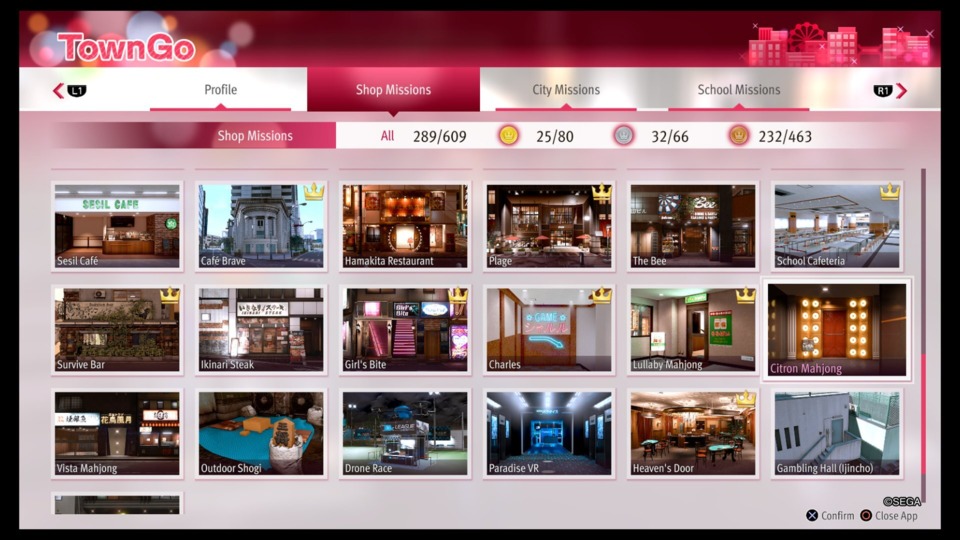
What's often a motivation dampener is that many of these mini-games and the missions relating to them have been in several RGGS games already; I'd say about 70% of the mini-game content in Lost Judgment was recycled directly from the first Judgment and Like a Dragon 7, or at least is fundamentally identical (the drone races, for example, are now set in Ijincho rather than Kamurocho but still play more or less the same). This is a major part of why I'm less inclined to put myself through the wringer for this stuff, given I've already done a lot of it before. Almost makes me wish the LaD/Judgment franchise had some way of carrying over series-wide mini-game completion with a single all-encompassing system like the old Uplay/Ubisoft Connect service, though I imagine that'd be a nightmare to implement.
For as ridiculous as some of the following requirements might sound, I still have half a mind to complete them regardless. Call it a sunk-cost fallacy for the majority of progress I've already completed, or an OCD tic. Fact of the matter is: Where some people have brain worms, I have brain Shai-Hulud.
TownGo City
Instead of going through everything, I'll just highlight potential brick walls: those that, if you weren't inclined in pursuing them over the course of the game, would generate no small amount of annoyance if you were to go back and grind them out.
For the most part, Lost Judgment's tweaks to the franchise's recurring combat system and the way you gain SP (Skill Points) means that you're rewarded for diversifying your approach to fighting enemies. For instance, defeating at least one enemy each with all three of Yagami's combat styles nets a pretty substantial SP bonus. Using either Snake's deflection counter or its "EX Surrender" (basically, scare an enemy into surrendering with an EX Action, previously known as Heat Actions) are also lucrative for the sake of levelling up fast. With a system like this, the game can encourage you to try out all manner of moves and tactics in a single battle for the extra gains, and those benefits apply also to drawing closer to all the combat milestones that TownGo's City category tracks.
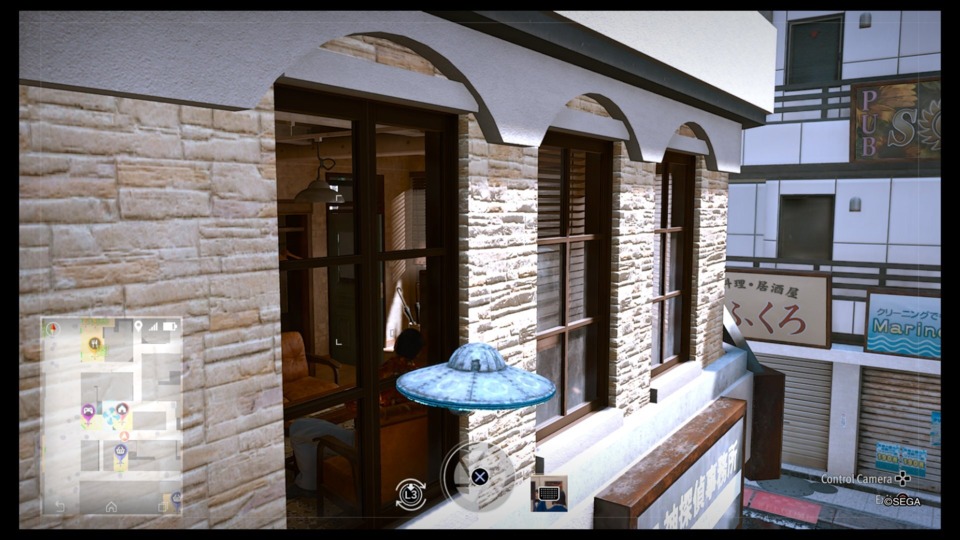
My two big roadblocks for combat involves using Extracts—powerful buff items with temporary effects, each of which needs to be crafted from found materials first—and the EX Burst mode, which is another temporary buff that burns through the same gauge the EX Actions use. In both cases, I don't really consider it a tactical advantage to constantly spend resources I probably don't need to spend. I'll quaff an Extract or hit EX Burst in a boss fight, of course, but since those are so few and far between they barely register on the milestone tracker. The game evidently wanted me to waste these precious contingencies on random street fights, which is one of the few cases where the tracker seems counterintuitive to playing the game smartly: the time/challenge difference between completing one of those battles with or without a buff is negligible, since it really only takes seconds to complete them with your standard level of power.
As for the exploration side of TownGo City, some brick walls include:
- Flying the drone around for an hour. Unless you're really hard up for resources, there's no real reason to do this and time spent in the drone races doesn't apply for some inscrutable reason. Using the drone is sometimes required for a certain collectible side-quest involving squirrel graffiti, but only for a few seconds apiece. Hell, you barely ever use it during the main story. This is one where I guess the intended course of action is to just switch to the drone and AFK for an hour while you get lunch or do your taxes or something.
- Walking the dog ten kilometers. There's a few valuable items you can only get by walking the Detective Dog himself, Ranpo, around both cities for a while but since you have to chance upon their locations there's no way you wouldn't just use an annotated map. Ranpo also doubles all the items you find as sparkles around the city, so it's another handy source for materials, but 10km is like five whole laps around either city so it seems a bit much. The reason you wouldn't want to walk around with the dog all the time, by the by, is that it limits your movement speed by half, prevents you from going into any buildings, and stops all random encounters (though that last might be a selling point if you just want to chill for a while).
- Taking one hundred photos. Obviously not the most taxing of missions—just pull out your smartphone and take 100 snaps—but what this will do is add 100 screenshots to your system's HDD without you perhaps realizing it. Now that's some meta-fuckery at work.
- Play with cats 100 times. I'm down with cats, but that's a lot of running around in circles to make the cat NPC active zone refresh and giving them chin scritches every few seconds. I think I maxed out every cat's affection after sixty rustles, so it's another case of the developers adding an extra 0 somewhere by mistake (there's a lot of those). I guess if I were more a cat lover (and I loved to run) I'd have knocked this out a long time ago.
- Play all eight Master System games. Yo, don't step to my Woody Pop, I'll leave you dumbfounded. Honestly, this one's only tough because of how hard it is to find all the carts; you only get the last one from beating the superboss, so...
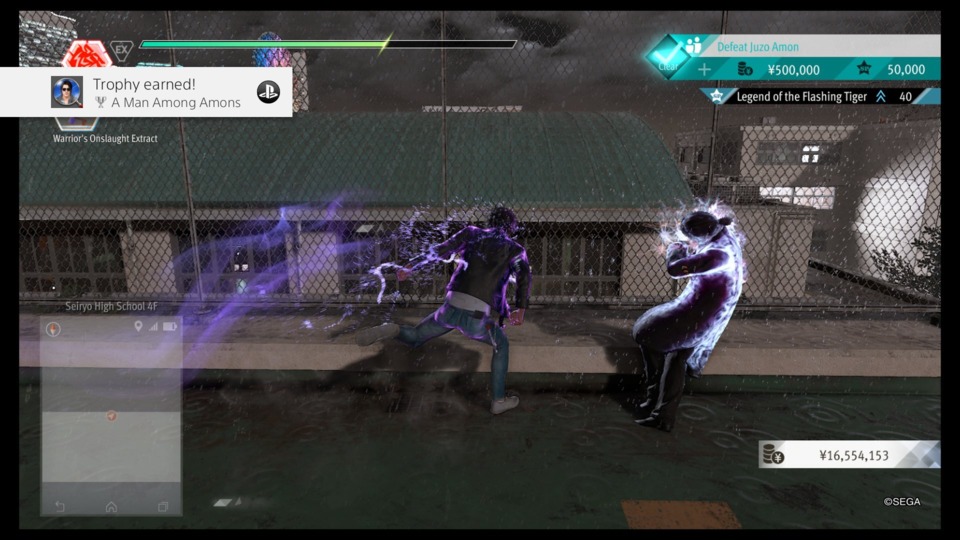
Verdict: I... I may have completed this whole category already.
TownGo School
Of the ten School clubs, here's where I rank their missions' difficulty (easiest to hardest):
- Casino: Just need to complete all the steps in the story, including winning one poker game.
- Photography: Ditto, only this was way harder to pull off and involved an annoying stealth mission.
- MRC: You can only finish the Mystery Research Club after completing all the others so it's tough to reach this point, but otherwise it's automatic progress as well.
- Girls' Bar: Won't go into why you need to drink and flirt with (thankfully adult) women for the sake of a high school club, but there's not much here besides finishing the story and playing darts with each girl three times each (you'll want to do that anyway since it builds affection fast).
- Biker Gang: There's a lot of Road Rash-style bike races but you only need to complete them for the missions, which you have to do anyway to complete the story here. The other missions relate to buying all the bike parts, which just needs money.
- Dance Club: This Beatmania-style rhythm game requires that you pass the high score for all four dance routines. Not too hard if you play on normal difficulty and use the score-booster bonuses. They replaced the karaoke for this, can you believe it?
- Skateboarders: You'll need your best thrashing skills for this pretty easy THPS variant. The race time trials are a bit tougher, partly because you have opponents that will throw Mario Kart weapons at you, but with the best board money can buy it's far from impossible.
- eSports Club: Just gotta play a whole lot of Virtua Fighter 5 Final Showdown. The no-damage wins are hardest, the rest just takes some time.
- Boxing Club: First round knock-outs for every opponent is no joke, especially with the last few.
- Robotics Club: OK, this is where it gets stupidly grindy. One of the Robotics Club missions is to develop every robot part and there's more than a hundred. You get most of the resources you need from completing official matches and practice matches on top of regular scrounging. However, the Robotics Club also has its own budget that is slowly increased with every three practice matches: even after completing all the required matches and acquiring all the components, I still need to complete at least 30 more practice matches against random mooks to afford everything. Another important part of why I don't want to do that is that this mini-game kinda sucks.
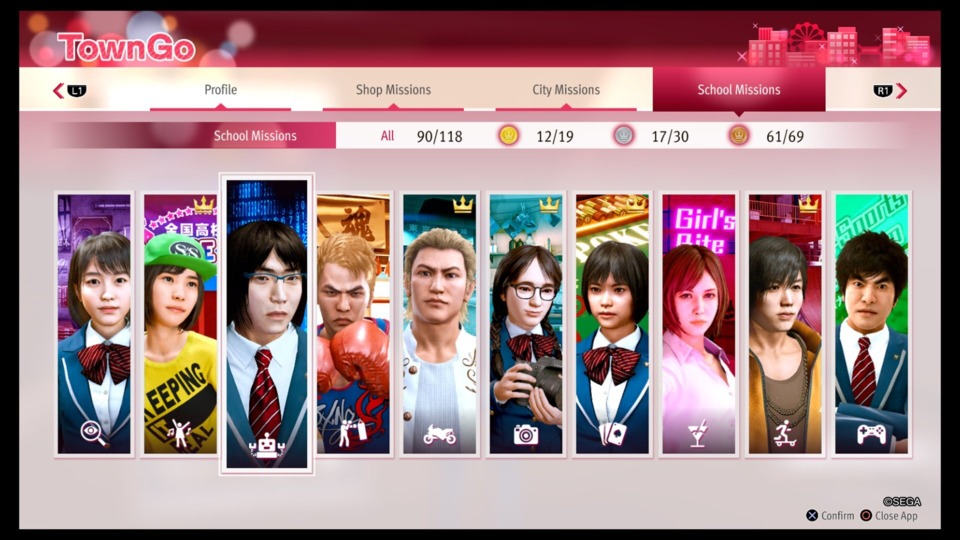
Verdict: Nope. The Robotics Club realization left me cold, and I don't think I enough patience for all those fast boxing and VF5 matches.
TownGo Shop
I feel like a good grousin' session, so let's go by mini-game here:
- Restaurants: Zero issue here with the bottomless stomach skill and plenty of cash. Cash is as trivial in this game as it was in the original Judgment: a single Dice & Cube VR game can net you up to several million in one attempt (even if you lose). There's over 600 Shop missions but it feels like 500 of those are just individual menu items.
- Arcade: All right, deep breath. There are forty missions associated with the arcade and the vast majority of those are tied up in fighters, a genre I generally don't excel at (did Sega not make any brawlers? Where's Altered Beast and Golden Axe? Seems like they'd be more fitting for RGGS.). As previously mentioned, VF5 FS takes up a big chunk of those, and the wins you earn here don't carry over into the School eSports Club totals (and vice versa) which is just asinine. Sega really wants you to start getting addicted to VF5, I guess. You also have to beat every character besides bosses in both Sonic the Fighters and Rival Schools, so I guess you better polish up your footsie game. Hama of the Dead, the game's House of the Dead parody, has some mostly grindy but not difficult missions—since you can start on any of the six levels, it's not so hard to beat. You don't even have to come first in the Motor Raid races to tick them off the list. The score targets in Super Hang-On, Fantasy Zone, and Space Harrier are all relatively easy to beat too (Super Hang-On gave me the hardest time of the three) and you only have to catch 15 prizes from the UFO Catcher, and doesn't even matter which ones. It's just the fighters that are the pain here, especially if you're not attuned.
- Batting Center: Oof. So this is usually not a mini-game that gives me problems, even the home-run derbies. Most of the recent RGGS games let you acquire something called the Serenity Bat which makes this mini-game much easier at the cost of earning fewer rewards. What also helps is that the pitches you get are the same each time you take on a specific challenge, so if you fail to hit the target goal of eight out of ten home runs you can just memorize which pitches go where and have a better chance next time. However, new to this game is a "Home-Run Competition" that requires completing several derbies in a row, with progressively harder pitches. Because there is no god in this cruel and unfeeling universe, the developers of this game determined that to earn the mission you'd have to complete 12 whole sets. That means you're essentially required to have a near-perfect batting record for over 100 pitches you've never seen before without taking a break. It's possibly one of the worst ideas the TownGo development team has had yet.
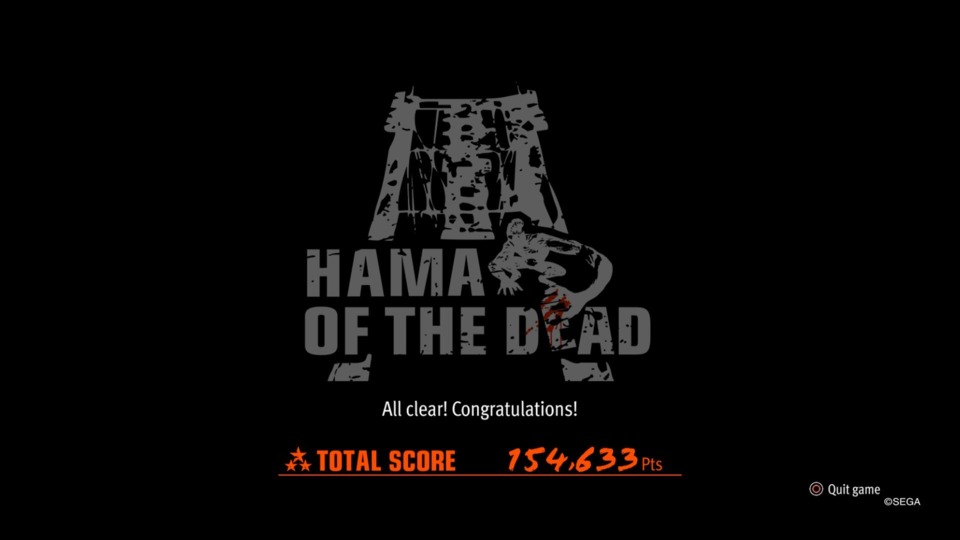
- Darts: You can bash these out while playing darts with the Girl's Bite members for their School mission set. Just need to play every mode at least once and get all the special scoring conditions like 180, three bullseyes, or three triples on any number that isn't 20. The darts are super easy in this game and get easier still with the right items.
- Mahjong: Here we go. I like mahjong just fine and I'm relatively good at it, so winning so many games isn't a tall order. The thing is this game has three mahjong parlors (I cannot even begin to fathom why) and you have to win ten times in each of them. You also have to come in first place for most of the tables at least once. This is more time-consuming than anything and there's always cheat items for the harder tables, but it's still a whole lot of luck-based green dragon puckey.
- Shogi: Comparatively, shogi is way nicer because you only have to win a handful of games at one place and it's very easy to find the cheat item for shogi that simply tells you what piece you should move next. The AI behind it sometimes needs time to ruminate, but you can knock out these missions no problem. The question is why you'd want to stare at two AI playing each other at shogi for half an hour per pop.
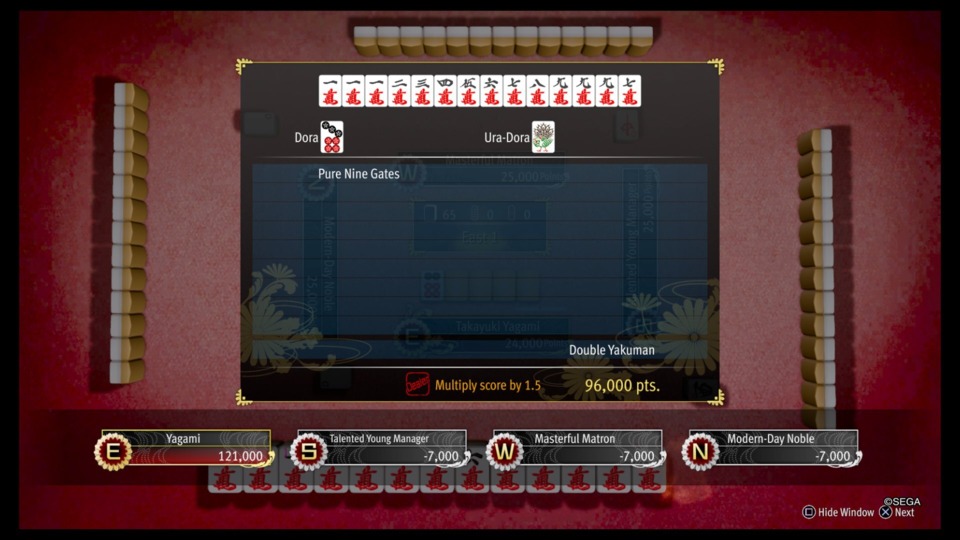
- Drone Races: I usually find these pretty tough because the higher levels require whizzing through buildings at F-Zero speeds without hitting anything, otherwise your plastic toy will shatter into a thousand pieces. Finding the materials for the super top-level model isn't too tough, thankfully; good, too, because this mini-game is pure pay-to-win and you can't beat any of the grand prix without the best parts.
- Paradise VR: This includes both the sugoroku game (here's a primer on those) and the new Aircelios mini-game, which is essentially just minute-length Geometry Wars. The former is where you earn vast amounts of money and has a substory and a trophy associated with it, so it's worth poking into for several reasons beyond this checklist. Super, super grindy missions here though: using skills 100 times is a tough ask when you're likely to pull out a skill five times at most in a normal game (they take points to use, and those points can be hard to come by). You also have to defeat three VR tigers, and while fighting a tiger isn't as big a deal as it sounds it means landing on a fight space on the board and being fortunate enough to have a big kitty be the opponent that shows up. Like a percentage of a percentage chance.
- Casino: There are two casinos. The first has blackjack and poker while the second has the hanafuda games koi-koi and oicho-kabu (from which the word "yakuza" originally came from, so every RGGS game is required to have it). Best plan is to buy enough chips/tags for the high-roller games and just use cheat items to net a huge score, as all the missions require a certain amount of earnings rather than sessions played. Koi-koi is the hardest to cheat at, though, so you're better off crossing your fingers for a good hand (or even know what a good hand looks like, first off).
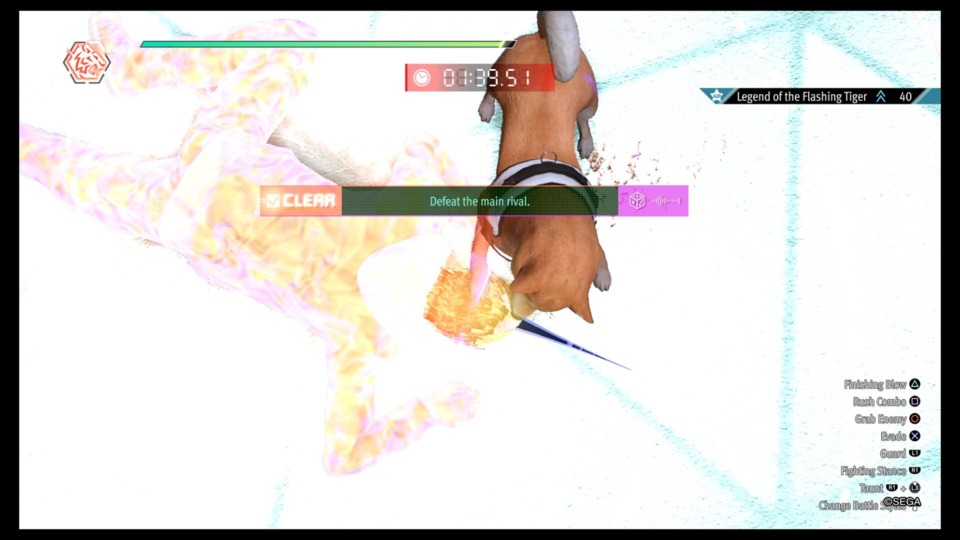
- Heaven's Golf: They just brought this over wholesale from Like a Dragon 7. It's a driving range where the goal is to get as close to the hole as possible, often avoiding obstacles and adjusting for wind (no idea where the wind comes from since it's all indoors. Some improbable Birdie Wing-level nonsense is involved, I suppose). There's also a separate bingo mode where you have to use ten drives to hit tiles on a 3x3 bingo grid, which means you're only allowed to miss once. The bingo mode is the much harder of the two.
Verdict: No. Hell no. Who the hell even has this kind of time? Convicts?
Conclusion
There's a reason I only play one RGGS game a year at most and it's because I get so weirdly obsessive with all this oft-recycled mini-game content that I find myself sticking to them even as I edge real close to burnout event horizon. It is satisfying to a probably unhealthy degree to tick off all these micro-challenges and I'm all for seeing every scrap of content a great game has for me (I guess it's related to why I usually clean my plate when eating), but I'll admit it's starting to get deleterious to my backlog-clearance progress, if not my health.
As for Lost Judgment as a game, well, I liked it about as much as the first one. The story can be really fun at times, if also a bit maudlin and melodramatic (when has Yakuza/Like a Dragon ever not been?), but the characters and twists make it worth sticking around to the end. I still much prefer the real-time combat of this series to the new turn-based direction of the core franchise, and Snake style is a really welcome new addition due to how it prioritizes counters and being enough of a badass to intimidate goons into giving up. The game also does away with the awful mortal damage feature of the first Judgment without affecting the difficulty curve too much; boss fights are still tough because enemies hit hard and Yagami doesn't have a huge amount of health to tank it all, even with the upgrades, meaning defensive plays like blocks, parries, and evades are as integral as ever. The best new addition are the School stories: they're like ten highschool shounen/shoujo anime in one, full of clichés but embodying that blend of earnest drama and occasional goofiness that makes both anime and the RGGS games shine. Of those, I think the Motorcycle Gang had the best story and the Boxing Gym the best mini-game; never been much of a boxing game guy, but it's so fast and fierce and a nice change of pace from the usual combat.
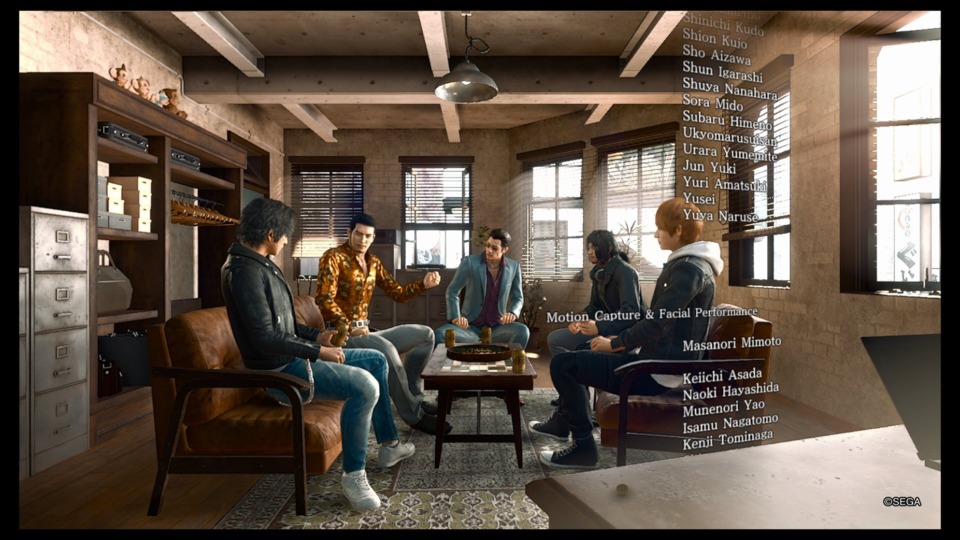
However, Lost Judgment still ultimately insists on being a detective game which means you have to deal with tailing missions (which suck), stealth missions (which suck), and chase missions (which would be fun if they weren't all the same). These were the worst parts of Judgment too, and it's not reassuring to know that the weakest elements of the series are apparently so indelible to the blueprint that they're almost certainly going to be with every subsequent Judgment to come. My hope is that the RGGS team continue to find new applications for this general open-world game format and apply it to other characters, stories, and thematic genres, if not whole other licenses like they did with Fist of the North Star. At this point I am very much ride or die with whatever they choose to make next, but my misgivings with fundamental aspects of both Judgment and current mainline Like a Dragon has me hoping for something fresh in the near future. Until then, I'll have Like a Dragon: Ishin! to look forward to for next year's RGGS playthrough. Pretty sure they won't make me fly drones and play arcade games in that one.
Log in to comment